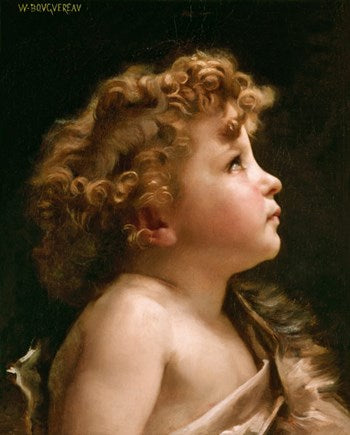Description
The work "San Juan Bautista de Niño", created in 1884 by William-Adolphe Bouguereau, stands as a brilliant example of the academic style of the nineteenth century, which predominated in his career and characterized much of the painting of the time. Bouguereau, a master Of the realistic representation, it stands out not only for its remarkable technical ability, but also for its ability to evoke emotions through the representation of characters often endowed with a raw and pure humanity. This painting, like many others of its repertoire, reflects both its mastery in the use of color and its deep understanding of light and shape.
In the center of the composition there is a representation of the child San Juan Bautista, who is portrayed with a palpable tenderness. His face, serene and contemplative, lights up with a soft light that gives life to his figure. This masterful use of light, which creates a subtle chiaroscuro, allows the viewer to submerge in the painting atmosphere. The child is dressed in a camel skin, an iconic symbol associated with his future as the precursor of Christ, which infuses the work a remarkable symbolic and spiritual burden.
Bouguereau uses a rich and varied color palette, in which warm tones that provide a sense of humanity and closeness to the character predominate. The golden nuances in the tones of the child's skin contrast with the most rough and naturalistic texture of their outfit, creating a visual balance that invites a deeper reflection on the duality between the earthly and the divine. Through this choice of colors, the artist not only physically represents the child, but also evokes a feeling of emotional warmth that resonates with the viewer.
The composition is built so that the main focus is located in the central figure, while the bottom, although present, remains in the background touch. While the background is suggested without many details, the nature that surrounds it and the softness of the color suggests a quiet and harmonious environment, possibly alluding to the desert in which San Juan Bautista lived, which allows the viewer to concentrate on the child and the slight expression of his face.
Although "San Juan Bautista de Niño" does not have additional characters, the child's loneliness in painting adds a layer of introspection. This representation manages to convey, in its silence, a connotation of prophecy about its future mission, and in this sense, Bouguereau invites reflection on the life and legacy of San Juan Bautista.
It is important to note that Bouguereau was subject to controversy in his time, since his academic style often clashed with the emerging currents of impressionism that sought to break with the previous representation conventions. Even so, his dedication to detail and his ability to create an emotional connection are ingredients that consecrate him as one of the most venerated painters of his time.
This work not only serves as a representation of the child San Juan Bautista, but is also a testimony of Bouguereau's artistic virtuosity, whose ability to capture the essence of the human figure remains unique. The action is frozen in an instant of reflection and calm, a reminder of the weight that innocence can even lead to those calls to great destinations. Bouguereau gives us a look that invites contemplation, making us participate in the sweet fragility of childhood and the reverberation of the spiritual.
KUADROS ©, a famous paint on your wall.
Hand-made oil painting reproductions, with the quality of professional artists and the distinctive seal of KUADROS ©.
Reproduction service paintings With a guarantee of satisfaction. If you are not completely satisfied with the replica of your painting, we refund your money 100%.

